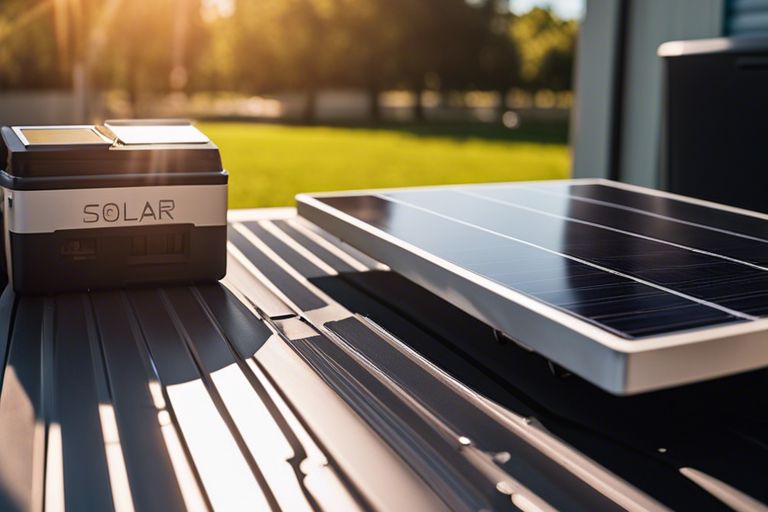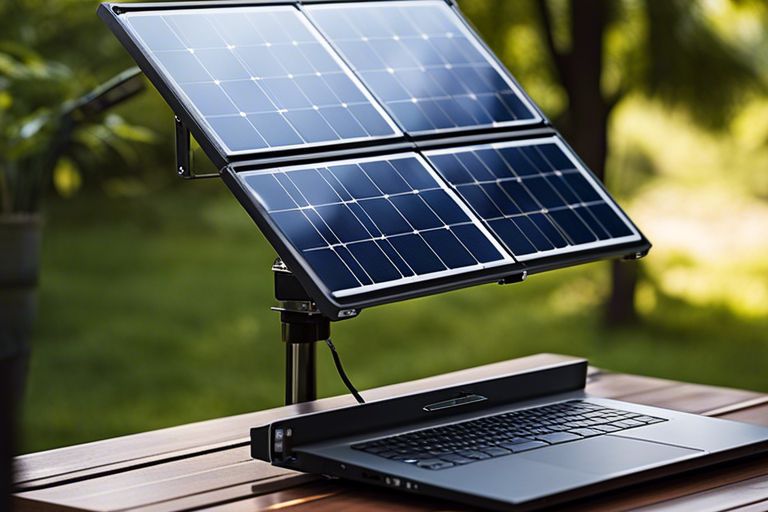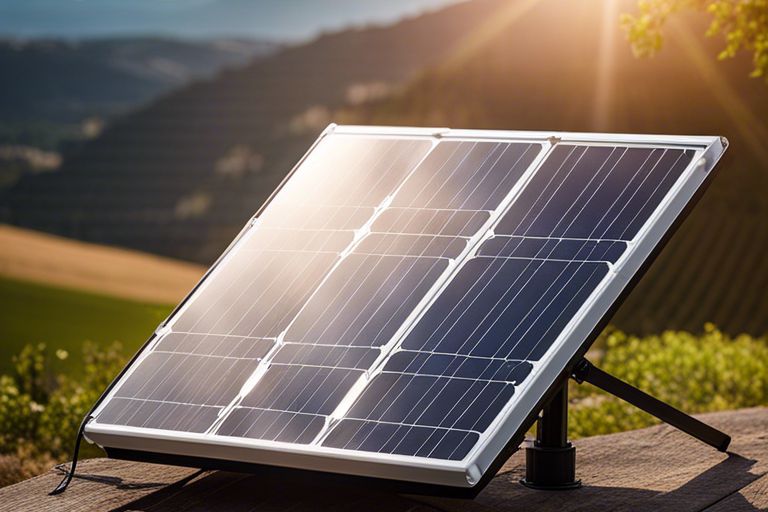#Appliances We often underestimate the power of a 100W solar panel. Imagine the possibilities if you harness its energy wisely. From charging your phone, running LED lights, to even powering a small fan on a hot day – the options are endless. Curious to know more about the capabilities of a 100W solar panel? Discover what you can run with it compared to a 200W panel What Will a 100 Watt Solar Panel Run vs 200 Watts? Full ….

Key Takeaways:
- Power small devices: A 100W solar panel can power small devices such as smartphones, laptops, tablets, lights, fans, and small appliances.
- Off-grid applications: It is suitable for off-grid applications like RVs, boats, cabins, and camping setups, providing energy independence in remote locations.
- Not suitable for high-power devices: While a 100W solar panel is versatile, it may not be sufficient to power high-energy-consuming devices like air conditioners, refrigerators, or heaters, which require larger solar systems.
Power Output and Efficiency
How much power does a 100W solar panel produce?
Before plunging into what a 100W solar panel can run, it’s necessary to understand how much power it produces. A 100W solar panel can generate up to 100 watts of power under ideal conditions. This means that in one hour of direct sunlight, the panel will produce 100 watt-hours (Wh) of electricity.
Factors affecting solar panel efficiency
For those wondering about the efficiency of a 100W solar panel, it’s necessary to consider various factors that can impact its performance. Some of the key factors influencing solar panel efficiency include:
- The angle and orientation of the panel towards the sun
- The presence of any shading on the panel
- The temperature of the panel
Recognizing these factors and optimizing them can help you get the most out of your solar panel system.
Understanding solar panel efficiency is crucial for maximizing the power output of your 100W solar panel. Factors such as the type of solar cells used, the quality of the panel construction, and how well-maintained the panel is can all influence its efficiency. By ensuring your panel is in optimal condition and taking steps to minimize any factors that may reduce efficiency, you can enhance the overall performance of your solar panel system.
- Regularly cleaning the panel to remove dirt and debris
- Ensuring proper installation and mounting to maximize sunlight exposure
Recognizing these aspects can help you make the most of your 100W solar panel and harness solar energy effectively.
Appliances and Devices
Little What can I power with a 100W solar panel? You may wonder what appliances and devices a 100W solar panel can run efficiently. Let’s break it down for you.
Small electronics: phones, laptops, and cameras
electronics: With a 100W solar panel, you can easily charge your small electronics like phones, laptops, and cameras. These devices have low power requirements and can be powered directly or by storing energy in a battery for later use.
Lighting: LED bulbs and strip lights
phones: LED bulbs and strip lights are highly efficient and perfect for running off a 100W solar panel. They provide ample lighting while consuming minimal power, making them ideal for off-grid lighting solutions.
A strip lighting system with energy-saving LEDs can be a practical choice for lighting up specific areas in your home or outdoor space. These lights can run for hours on the energy collected by your solar panel during the day.
Refrigeration: small coolers and fridges
small: Regarding refrigeration, a 100W solar panel can power small coolers and fridges effectively. These appliances are designed to be energy-efficient, making them suitable for off-grid or backup refrigeration needs.
strip: Strip lights are versatile and can be used for various lighting applications, including accent lighting, task lighting, or even as ambient lighting. With a 100W solar panel, you can easily set up a solar-powered lighting system to meet your specific needs.

Energy Consumption
Calculating energy consumption: watt-hours and amps
An important aspect of understanding what a 100W solar panel can power is calculating your energy consumption in watt-hours and amps. You can determine the watt-hours by multiplying the watts of each device by the hours it runs. For instance, if a device uses 50W and runs for 5 hours a day, the daily energy consumption would be 250 watt-hours (50W x 5 hours).
Estimating energy needs for your devices
For estimating the energy requirements of your devices, you need to identify the power consumption in watts of each electronic gadget you plan to run off the solar panel system. This information is usually indicated on the device or in its manual. Remember to consider how many hours per day you will be using each device to calculate the total energy needed.
Understanding the power consumption patterns of your devices is crucial for determining the size of your solar panel system. High-power devices like refrigerators or air conditioners will require more energy than low-power devices like LED lights or laptops. By estimating the energy needs of each device accurately, you can ensure that your 100W solar panel setup meets your requirements efficiently.
System Configuration
Many factors go into configuring a solar panel system to maximize its efficiency and power output. One crucial aspect to consider is how to connect your solar panels, whether in series or parallel connections. Each option has its own set of pros and cons, which you should weigh carefully before making a decision.
Series and parallel connections: pros and cons
| Series Connections | Parallel Connections |
| Increases voltage | Increases current |
| Less affected by shading | Easy to expand system |
| Higher voltage poses safety risks | May require more complex wiring |
| Single panel failure affects system | Lower voltage than series connections |
You should carefully consider whether the benefits of higher voltage or increased current better suit your needs based on your system requirements and limitations.
Charge controllers and battery selection
Configuration, when it comes to charge controllers and battery selection, plays a crucial role in ensuring the longevity and efficiency of your solar panel system.
parallel charge controllers allow you to independently control the charging of multiple battery banks, providing flexibility and customization.
To properly size your charge controller and select the right type of batteries for your system, you must consider the total wattage of your solar panels, the voltage of your system, and your daily power consumption.
Real-World Applications
Camping and outdoor adventures
All set for your camping trip, you can power up imperative devices with a 100W solar panel. You can run small electronic devices like smartphones, tablets, or even a portable fan to keep cool in the heat. Additionally, you can charge your camera to capture all the memorable moments in the wilderness.
Remote cabins and off-grid living
One way to utilize a 100W solar panel is to power up remote cabins and live off the grid. You can run lights, a small refrigerator, charge laptops, phones, and other imperative electronics in your remote abode. Moreover, you can power up small kitchen appliances like a toaster or a coffee maker for a slice of modern comfort in your secluded retreat.
With a larger battery storage system, you can even power more energy-intensive devices like a microwave or a small TV. This setup can provide you with the convenience of modern living even in the most isolated locations.
Emergency power backup systems
In case of emergencies, having a 100W solar panel as part of your backup power system can be a lifesaver. You can keep critical devices like a radio, flashlight, or medical equipment running during power outages. Additionally, you can charge your phone to stay connected with loved ones or emergency services during unforeseen situations.
Another advantage of a solar-powered backup system is its reliability. You can rely on the sun to keep generating power even when the grid is down, ensuring a constant source of electricity when you need it the most.
Limitations and Considerations
Cloudy days and low-light conditions
The performance of a solar panel is highly dependent on sunlight. The amount of power generated will be significantly lower on cloudy days or in low-light conditions. During these times, you may not be able to run as many appliances or devices with your 100W solar panel as you would on a sunny day.
Panel maintenance and cleaning
It is important to keep your solar panel clean and well-maintained to ensure optimal performance. Dust, dirt, or debris can accumulate on the panel’s surface, reducing its efficiency. Regularly cleaning your panel and ensuring it is free from any obstructions will help maximize the power output.
Additionally, you should inspect your solar panel for any damage or wear regularly. Cracks or damage to the panel can impact its performance and longevity. By maintaining and cleaning your panel properly, you can prolong its lifespan and ensure it continues to run efficiently.
Inverter selection and compatibility
When setting up a solar panel system, you need to carefully consider the selection of an inverter and its compatibility with your panel. The inverter is crucial for converting the DC power generated by the solar panel into usable AC power for your appliances. Choosing the right inverter size and type that is compatible with your 100W solar panel is important for optimal performance.
Ensure that the inverter you select can handle the power output of your solar panel and is compatible with the electrical systems in your home. Proper inverter selection and compatibility will help you make the most of your solar panel system and ensure a seamless energy conversion process.
Conclusion
The possibilities of what a 100W solar panel can run are versatile, offering you energy independence and environmental sustainability. By harnessing the power of the sun, you can power small appliances like lights, phone chargers, radios, and even laptops. Embracing solar energy not only reduces your electricity bill but also minimizes your carbon footprint, contributing to a cleaner and greener future.
The utilization of a 100W solar panel empowers you to embrace a more self-sufficient lifestyle, allowing you to enjoy the benefits of renewable energy. From camping trips to emergency backup power at home, integrating solar power into your daily life opens up a world of possibilities. So, consider investing in a 100W solar panel and start harnessing the sun’s energy to run your imperative devices today.
Q: What can a 100W solar panel run?
A: A 100W solar panel can run small electronic devices such as smartphones, laptops, tablets, LED lights, fans, and small appliances like a mini fridge or a coffee maker.
Q: Can a 100W solar panel power a house?
A: A single 100W solar panel is typically not sufficient to power an entire house, as the energy output is relatively low. However, it can be used as a supplementary power source for specific appliances or lighting in a small cabin, RV, or boat.
Q: How long can a 100W solar panel run on a full charge?
A: The duration a 100W solar panel can run on a full charge varies depending on the energy consumption of the connected devices and the amount of sunlight available. On average, a 100W solar panel can run small devices for several hours to a full day on a full charge.
